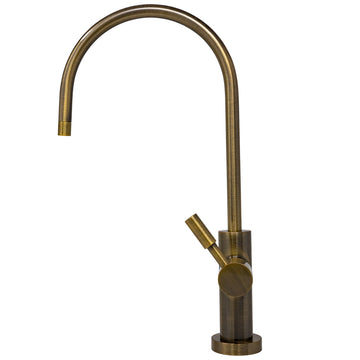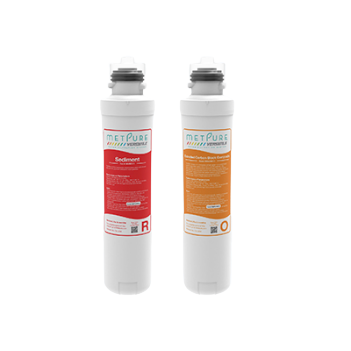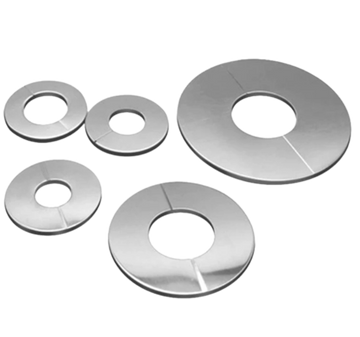Faucet water filters are a must-have for homeowners in 2025. These point-of-use systems treat water locally at your drinking faucet, offering a simple setup, minimal space consumption, and low energy costs.
Despite a basic design, they've evolved to clean toxins like PFAS, lead, chlorine, and bacteria instead of treating odor.
Here’s our extensive review of the best faucet water filters in 2025.
How To Choose The Right Water Filter For Your Home
To find a compatible faucet water filter for your household, you must check a few factors.
-
Filtration Technology
The most crucial factor is the kind of filter material used in a faucet filter; the best choice depends on your home's water quality.
- If you have unclean tap water, you’ll need a Reverse Osmosis (RO) system for thorough cleaning.
- Activated carbon filters will work well if your water is clean but tastes of chlorine or rust or has terrible odors.
- UV + sediment filters are essential for using well water as they eliminate all bacteria alongside salt.
- If your water has more sediment or lead content, filters with mechanical meshes and ion exchange barriers are the best.
To evaluate your home water quality, check the EPA’s site for your county and look under Local Drinking Water Information. CIf that doesn't work, callthe Safe Drinking Water Hotline or county health ddepartment If you're still unsure, have a professional do water quality testing.
-
Flow Rate & Storage
The standard flow rate from a faucet is 1-2.2 gallons/min. Attaching a faucet-mounted filter only lowers it to around 0.5 gallons/min. However, RO filters are much slower (average 0.03-0.1 gallons/min). Always purchase an RO filter with a large storage tank to reduce your wait time.
-
Repair Costs
Water filters help you save money on bottled water and cut back on plastic. Still, you have to foot occasional maintenance costs. Always opt for systems that have easy-to-find spares and replacement filters. When shopping, keep the cost of replacement cartridges and energy consumption in mind.
-
Certifications
Another element to consider is whether the filter is certified. Certified filters meet industry criteria and are higher in quality. In the States, look for NSF/ANSI or WQA certifications when choosing a faucet water filter.
Our Testing Criteria
For our guide, we evaluated the top faucet water filters in the market, testing them on four essential factors.
1. Performance
The most important metric we judged was the actual filter efficacy—and whether or not the water was indeed purified. We performance-tested water filters by comparing pre- and post-filter water for TDS and taste changes.
2. Flow Rate
The filter flow rate shows how much water a filter can produce in a set time. Filters sell at 50 GPD, 100 GPD, or more, yet their actual output is much less. We thoroughly tested our top picks for flow rates most approximate to the guaranteed number.
3. Design
Of course, a good product combines functionality with solid design. We reviewed each filter's dimensions, material quality, and strength to find you the longest-lasting one.
4. Installation
We also tested the installation process and how easy it was to replace the filters inside.
Top 5 Best Faucet Water Filters- Ranked
Best Overall- Metpure Versatile RO Water Filter Faucet

Type- Reverse Osmosis
Certifications- NSF/ANSI-certified
PFAS Removal? Yes
Chloride Removal? Yes
Warranty- 24 Months.
Pros
- Modern purification technology cleans 99% of all toxins.
- Easy maintenance with quick-twist filter replacement.
- The compact design saves 3x the space of a traditional filter.
Cons
- A reverse osmosis system uses 4-5 gallons of fresh tap water to produce 1 gallon, creating high-mineral wastewater.
Metpure's Versatile Reverse Osmosis Water Filter is an under-sink system linked directly to your kitchen faucet for clean drinking water. The filtration system contains a sediment filter, a carbon composite filter, an RO membrane, and another carbon post filter. These four work exceptionally well at removing foreign particles, including lead, mercury, rust, sand, silt, and more.
The RO membrane treated most dissolved solids and harmful bacteria, even with water from old piping systems. The two carbon filters also worked well to remove PFAS and odors that affect the water's taste profile.
Each filter kit includes a BPA-free 3.2-gallon attachable tank for storage, color-coded tubing, and a lead-free faucet for pouring. The materials feel durable and work well under high pressure. A simple homeowners guide for easy setup and an extended 2-year warranty are included.
Best Faucet-Mounted Filter- PUR Plus Faucet Filtration System
Type- Activated Carbon
Certifications- NSF 42,53,401
PFAS Removal? Yes
Chloride Removal? Yes
Warranty- 24 Months.
Pros
- Effective purification against chlorinated compounds.
- It contains a filter change indicator light that blinks when maintenance is due.
- Easy installation that adapts to most faucets.
Cons
- The connections and lever included are made of plastic.
- Doesn't clean lead and other TDS effectively.
If you're keen on saving space with your filtration system, a faucet-mounted filter is your best bet. Our top pick is the PUR Plus—it removes 99% of all chlorinated compounds, PFAS, and VOCs and contains mineral stones that improve the water's crispiness and taste.
The best part about the faucet-mounted filter is the ease of installation. Setting up only takes a few minutes and needs zero tools. However, remember that the filter isn't adjustable, so the design might not be the right fit if your sink or existing faucet is angular or oddly shaped.
Best Premium Faucet Filter- Waterdrop G3P800 Tankless RO System

Type- Reverse Osmosis
Certifications- NSF/ANSI-certified, NSF 357.
PFAS Removal? Yes
Chloride Removal? Yes
Warranty- 24 Months.
Pros
- IIt includesa brilliant faucet that shows TDS levels and wthequantity lof water left over
- It uses UV filtration to clear out most harmful bacteria.
- Has a high 800 GPD flow rate.
Cons
- The filtration system and replacements are expensive.
While the price of Waterdrop’s G3P800 is staggering at first glance, it's well worth the money if you have a larger budget. The filter kit has a high flow rate at 800 GPD, filling up one cup in just 6 seconds. The pure-to-drain water ratio is also high at 3:1, meaning there's little westward.
The best part, though, is the 9-step ultra-purification system, which guarantees the loss of 99.9%of harmful bacteria and pesticides. The kit has UV sterilizing light, sediment filters, and reverse osmosis filters, which work well together. We used the filter on healthy water and found it quickly removed all PFAS plus salt and bacteria. The filter package also contains a brilliant faucet showing the TDS levels and water quantity. All in all, it is an expense worth its cost.
Best Affordable Undersink Filter- Metpure Non-RO MV2-RB 2-Stage Filter
Type- Activated Carbon
Certifications- NSF/ANSI-certified
PFAS Removal? Yes
Chloride Removal? Yes
Warranty- 24 Months.
Pros
- Simple compact design & easy undersink installation.
- No wastewater is produced, and no drainage system is needed.
- Easy quick-twist filter design for replacement.
Cons
- Does not remove TDS (heavy metal particles and tiny microorganisms).
- No storage tank included.
The MV2-RB is an under-the-counter water filter that works with most home faucets and provides a clean water supply. It's an affordable option for those with a relatively clean water supply but taste chlorine and other bitter solutes that need treatment. It's an effortless point-of-use installation that takes minutes to set up and runs for months.
The filtration kit has two filters, a sediment remover that acts on rust and dirt and an activated carbon GAC filter which further refines the water, cleaning PFAS. Per our use, the filter treats color and odors well. However, it's not good for bore water or water with high TDS content.
The kit has no storage tank and occupies a small space. It comes with a brushed nickel faucet, appropriate fittings, a manual, and a 2-year system warranty.
Best Countertop Filter- iSpring CKC1C
Type- Carbon CTO
Certifications- WQA-certified
PFAS Removal? Yes
Chloride Removal? Yes
Warranty- 12 Months.
Pros
- Easy to install with a compact size.
- Highly effective against organic compounds like VOC.
- No wastewater was created.
Cons
- TDS removal is inadequate.
- No storage tank included.
Nobody beats the iSpring when it comes to a sleek and compact filter system design. The machine can be installed and connected to any nearby faucet. The body is made of a transparent filter housing, which lets us see if and when the filter needs changing.
For purification, the main filter is a WQA-certified coconut-shell carbon block that removes 90-95% of chlorine, sand, odors, and rust. Per our testing, it's also really good against VOCs and dissolved chemicals. However, it can't get rid of heavy metals and TDS, which includes some bacteria.
Types of Faucet Water Filters
There are 3 main types of faucet water filters which you can hook up directly to a drinking tap.
-
Under-Sink Filters
Direct attachment filters, better known as under-sink filters, are exactly as the name suggests. These water filters are installed below a kitchen sink, away from sight, with a simple connection to the faucet. Most RO systems are under-sink designs.
-
Faucet-Mounted Filters
Faucet-mounted filters are small water filters that you latch onto an existing faucet. They treat water as it comes, often lowering the flow rate to ensure proper purification. They're also inexpensive but require more frequent replacements.
-
Countertop Filters
Countertop filters are pitcher-like filters that can be installed on a wall or kept next to the sink. You can connect them to your current faucet for fast cooking and drinking water, but they are space-consuming.
Want to learn more about the different types of filters? Check out our guide: Types of Water Filters – A Complete Guide.
Difference Between Faucet Water Filter Materials
While faucet water filters usually have a carbon-based inner filter, the body can be made from several materials. Each of these has its perks. Stainless steel and plastic are the two most common ones. Steel is better overall, with high resistance to corrosion and longer durability. However, it’s heavier and often more expensive.
Plastic is the opposite. It's cheaper and lighter but more complicated to clean and can leech microparticles, especially under high temperatures. As for faucets, brushed nickel and brass are the safest options, as they’re lead-free and corrosion-resistant.
Why Buying A Certified Filter Is Important
If you've been browsing filters online (or reading through this guide in detail), you've probably noticed these filters' various certifications. But what are they, and why are they important?
In the USA, third-party associations have set standards for product quality and provide certifications for safe water filters that meet industry needs. The National Sanitation Foundation (NSF) is an important one.
NSF-certified faucet filters are proven to filter out harmful toxins and are manufactured with high-quality, BPA-free, and lead-free products. This unbiased testing also improves customer trust in brands. Aside from NSF, WQA certifications are also useful. WQA S-300 certification evaluates the quality of point-of-use RO filtration systems.
Conclusion
If your tap water quality isn't adequate, faucet water filters are a quick and easy solution for clean drinking water. To choose the best faucet water filter, consider your household size, type, and water quality; for example, if you don't have a clean water supply, simple carbon filters aren't enough. The best filter for you is one that matches your drinking water needs and is within the proper budget.
















